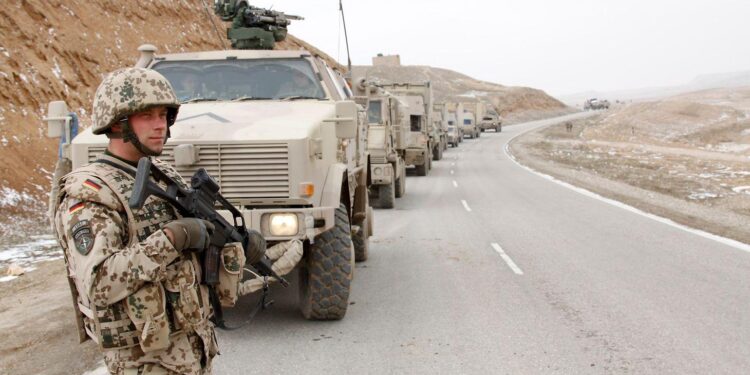In a significant development regarding the ongoing security situation in Afghanistan, the Pentagon has announced that collaboration with the Taliban in combating the Islamic State-Khorasan (ISIS-K) is a possibility. This statement comes amid rising concerns over the resurgence of ISIS-K, which has claimed responsibility for a series of deadly attacks in the country since the Taliban’s takeover in August 2021. As the humanitarian crisis deepens and international relations remain strained, the prospect of cooperation between former adversaries highlights the complex and evolving landscape of Afghan politics and security. This article delves into the implications of the Pentagon’s remarks and what it means for Afghanistan’s future stability and the global fight against extremism.
Pentagon Explores Collaborative Strategies with Taliban to Combat ISIS-K Threats
The Pentagon has initiated discussions regarding a potential partnership with the Taliban, aiming to enhance measures against the growing threat of ISIS-K in Afghanistan. U.S. officials recognize that while collaboration may be controversial, it presents a unique opportunity to address shared security concerns. With the Taliban’s local knowledge and control over vast territories, American military strategists are weighing the benefits of intelligence sharing and operational coordination to combat the escalating violence perpetrated by extremist factions. Recent attacks attributed to ISIS-K have raised alarms, indicating an urgent need for a unified approach to stabilize the region.
Key elements being considered in these discussions include:
- Intelligence Sharing: Providing real-time data about the movements and activities of ISIS-K.
- Operational Coordination: Joint operations to target high-profile ISIS-K leaders.
- Resource Allocation: Utilizing existing Taliban resources for security interventions.
- Stabilization Initiatives: Working simultaneously to improve local governance and humanitarian efforts.
Despite the complexities of engaging with a regime often criticized for its human rights record, the U.S. remains focused on protecting its interests and preventing further chaos in Afghanistan. As negotiations progress, the international community watches closely, aware that the ramifications of this partnership could shape the future of security operations in the region.
Implications of U.S.-Taliban Cooperation for Regional Stability and Security
The Pentagon’s recent assertion that cooperation with the Taliban in the fight against ISIS-K is feasible raises significant questions about the broader implications for stability in Afghanistan and surrounding regions. As the Taliban seeks international legitimacy while combating a mutual adversary, this collaboration could potentially recalibrate alliances within South Asia. Stakeholders such as Pakistan, India, and Iran may adjust their foreign policies, and conflicts of interest could arise, thereby redefining the regional power dynamics. The possible normalization of U.S.-Taliban relations also highlights a tenuous balancing act, where the U.S. must navigate the dual challenges of addressing humanitarian concerns while simultaneously grappling with security threats from extremist groups.
However, the challenges remain considerable. Key considerations include:
- Security Dilemmas: The potential for Taliban to leverage U.S. support for internal consolidation, potentially sidelining moderate factions and exacerbating intra-Taliban conflicts.
- Human Rights Concerns: Continued humanitarian crises raise moral questions about cooperation, especially given the Taliban’s track record on human rights since regaining control.
- Regional Reactions: Neighboring countries may perceive this partnership as a threat, possibly leading to increased militarization or proxy conflicts.
To illustrate the shifting landscape, the table below summarizes the key regional players and potential responses to U.S.-Taliban cooperation:
| Country | Potential Response |
|---|---|
| Pakistan | Increased military engagement with the Taliban to influence their policies. |
| India | Heightened security measures and support for anti-Taliban forces. |
| Iran | Strengthening ties with local militias to counter increased U.S. presence in the region. |
Key Recommendations for Effective Engagement in Afghanistan’s Evolving Landscape
In navigating the complexities of Afghanistan’s current political landscape, understanding the nuances of engagement is critical for external stakeholders. Establishing effective communication channels with the Taliban, while maintaining a focus on mutual objectives, is essential. This involves:
- Active Dialogue: Engaging in continuous conversations to build trust and address security concerns.
- Shared Intelligence: Collaborating on intelligence-sharing platforms to enhance the fight against common threats, notably ISIS-K.
- Humanitarian Support: Ensuring that humanitarian assistance reaches the most affected populations while fostering relations with the Taliban for smoother operations.
Furthermore, a multifaceted approach that includes regional partnerships is vital. The role of neighboring countries cannot be understated as they can provide valuable insights and support frameworks. Key strategies include:
- Regional Collaboration: Working with countries in the region that share an interest in stabilizing Afghanistan.
- Normalization Incentives: Offering incentives for the Taliban to engage positively, such as recognition on the global stage for meaningful reforms.
- Monitoring Progress: Establishing benchmarks for measuring the Taliban’s commitment to combating terrorism and safeguarding human rights.
| Strategy | Goal | Expected Outcome |
|---|---|---|
| Active Dialogue | Build Trust | Smoother negotiations |
| Shared Intelligence | Enhance Security | Reduced terror threats |
| Humanitarian Support | Foster Relations | Improved humanitarian access |
Insights and Conclusions
In summary, the evolving dynamics in Afghanistan continue to capture global attention, particularly with the Pentagon’s indication that collaboration with the Taliban in the fight against ISIS-K may be a feasible option. As the situation develops, both the international community and regional stakeholders will be watching closely to see how these potential alliances could reshape security strategies and influence stability in the region. The complexities of these relationships underscore the challenges that lie ahead for Afghanistan as it navigates its post-war landscape in the face of ongoing threats. As new reports emerge, further analysis will be crucial in understanding the implications of these developments for Afghanistan and beyond.














